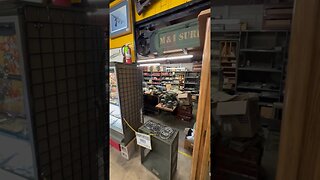Premium Only Content
3 iconic knives 🔪 performing flawlessly
"Khukri", "Khukuri" and "Kukuri" redirect here. For other uses, see Kukri (disambiguation).
Kukri
Knife (Kukri) with Sheath MET 36.25.831a b 001 Apr2017.jpg
A kukri with sheath
Type Bladed melee weapon, utility tool
Place of origin Gorkha Kingdom
Service history
In service c. 7th century – present[1]
Used by Gurkhas and Kiratis (natively)
Wars
Gurkha War
Anglo-Afghan Wars
Sino-Nepalese War
Third Nepal–Tibet War
World War I
World War II
1962 Sino-Indian War
Second Indo-Pakistani War
1967 Sino-Indian War
Third Indo-Pakistani War
Falklands War
Kargil War
War in Afghanistan (1978–present)
Specifications
Mass 450–900 g (1–2 lb)
Length 40–45 cm (16–18 in)
The kukri (English: /ˈkʊkri/)[2] or khukuri (Nepali: खुकुरी, pronounced [kʰukuri]) is a type of short sword with a distinct recurve in its blade originated in Nepal. It serves multiple purposes as a melee weapon and also as a regular cutting tool throughout most of South Asia. The kukri, khukri, and kukkri spellings are of Indian English origin,[3][better source needed] with the original Nepalese English spelling being khukuri.[citation needed]
Originating from the Indian subcontinent, the kukri is the national weapon of Nepal, traditionally serving the role of a basic utility knife for the Nepali-speaking Gurkhas,[4] and consequently is a characteristic weapon of the Nepali Army.[5]
There have been, and still are many myths surrounding the kukri since its earliest recorded use in the 7th century—most notably that a traditional custom revolves around the blade in which it must draw blood, owing to its sole purpose as a fighting weapon, before being sheathed. However, they are frequently used as regular utility tools.[6][7]
MACHETE !!!
A machete (/məˈʃɛti/; Spanish pronunciation: [maˈtʃete]) is a broad blade used either as an agricultural implement similar to an axe, or in combat like a long-bladed knife. The blade is typically 30 to 45 centimetres (12 to 18 in) long and usually under 3 millimetres (1⁄8 in) thick. In the Spanish language, the word is possibly a diminutive form of the word macho, which was used to refer to sledgehammers.[1] Alternatively, its origin may be machaera, the name given by the Romans to the falcata.[2][3] It is the origin of the English language equivalent term matchet,[4] though it is less commonly used. In much of the English-speaking Caribbean, such as Jamaica,[5] Barbados, Guyana, Grenada, and Trinidad and Tobago, the term cutlass is used for these agricultural tools.[6]
-
 1:00
1:00
Doggorunning
1 year agoWe Have More To Look at in The Supply Room! Subscribe
118 -
 23:43
23:43
Jasmin Laine
2 hours agoLiberal Minister Demands ‘MAGA Apology’—MELTS DOWN Over ‘Trade War’
4K3 -
 LIVE
LIVE
LFA TV
19 hours agoLIVE & BREAKING NEWS! | TUESDAY 11/25/25
861 watching -
 LIVE
LIVE
freecastle
7 hours agoTAKE UP YOUR CROSS- Be devoted to one another in LOVE. Honor one another ABOVE yourselves!
135 watching -
 18:24
18:24
Neil McCoy-Ward
2 hours agoA Warning For European Citizens (THIS IS BAD!)
14.8K8 -
 1:29:42
1:29:42
The Quartering
4 hours agoTrumps Turkey Pardon Roast, Woke Pastor Destroyed, AI To Replace 40% Of Workers & More
110K13 -
 1:08:32
1:08:32
DeVory Darkins
5 hours agoBREAKING: Minnesota Judge Makes FATAL MISTAKE Overturning Jury’s $7.2M Somali Fraud Verdict
128K99 -
 7:40
7:40
Colion Noir
3 hours agoArmed 7-Eleven Clerk Shoots Attacker & Gets Fired
23.3K46 -
 2:07:24
2:07:24
Side Scrollers Podcast
7 hours agoAsmongold/DSP RESPONSE + Kaceytron’s Life IMPLODES + Lunduke Gets Threats + More | Side Scrollers
117K7 -
 2:22:52
2:22:52
Steven Crowder
8 hours agoDonald Vs. Ilhan: Trump Boots Somalis and The Meltdown is Glorious
555K425